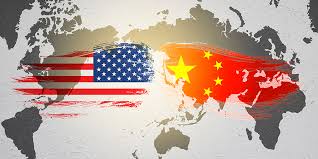According to Katherine Tai, the nominee for the posy of trade representative of the United States as chosen by President Joe Biden, the new administration would continue to work to address a range of trade related issues with China including a number of "unfair" trade and economic practices of the country. The US would also want to classify censorship by Chinese government as a form of trade barriers, Tai said.
Tai would also try to make use of the enforcement consultation process that was started under the former President Donald Trump's "Phase 1" trade deal with China so that the US is able to make sure that the intellectual property of American companies is protected, she said in written answers to senators' questions following her confirmation hearing last week.
"I am open to exploring a wide range of options to address our long-standing problems with China’s unfair trade practices, including bilateral talks," Tai wrote. "However, I will not hesitate to act if those talks prove ineffective," she added, without naming specific consequences.
All restrictions that prevent American companies to access various market segments thereby preventing their right to competition for US companies would be addressed by her, she said. She specifically pointed out the market segments for this purpose which include cloud computing.
US businesses are also put at a disadvantage because of the censorship policies of the Chinese government, Tai told Republican Senator John Cornyn, and added that if her candidature was confirmed by the Congress, she would work with the Senator "to develop trade policies that treat censorship as a trade barrier."
These statement were made by Tai to the questions of the Senate Finance Committee even as a report on the trade agenda for the Biden administration was released by the U.S. Trade Representative's Office which included debating a border adjustment tax on goods from countries that have high carbon footprint and a pledge to address the issue of forced labour by China in the country’s Xinjiang province region.
Tai said that she would strive to "ensure that those tariffs are appropriately responsive to China’s practices and take into account the impact on U.S. businesses, workers and consumers", when she was questions about how she planned to handle "Section 301" tariffs on Chinese goods and tariff exclusions that are set to expire soon.
Tai also said that she would coordinated with the Department of Energy and the Department of Agriculture to ensure greater market access for US energy companies in terms of exporting energy goods including liquefied natural gas and ethanol which was a positive for the country's energy sector.
(Source:www.thestar.com)
Tai would also try to make use of the enforcement consultation process that was started under the former President Donald Trump's "Phase 1" trade deal with China so that the US is able to make sure that the intellectual property of American companies is protected, she said in written answers to senators' questions following her confirmation hearing last week.
"I am open to exploring a wide range of options to address our long-standing problems with China’s unfair trade practices, including bilateral talks," Tai wrote. "However, I will not hesitate to act if those talks prove ineffective," she added, without naming specific consequences.
All restrictions that prevent American companies to access various market segments thereby preventing their right to competition for US companies would be addressed by her, she said. She specifically pointed out the market segments for this purpose which include cloud computing.
US businesses are also put at a disadvantage because of the censorship policies of the Chinese government, Tai told Republican Senator John Cornyn, and added that if her candidature was confirmed by the Congress, she would work with the Senator "to develop trade policies that treat censorship as a trade barrier."
These statement were made by Tai to the questions of the Senate Finance Committee even as a report on the trade agenda for the Biden administration was released by the U.S. Trade Representative's Office which included debating a border adjustment tax on goods from countries that have high carbon footprint and a pledge to address the issue of forced labour by China in the country’s Xinjiang province region.
Tai said that she would strive to "ensure that those tariffs are appropriately responsive to China’s practices and take into account the impact on U.S. businesses, workers and consumers", when she was questions about how she planned to handle "Section 301" tariffs on Chinese goods and tariff exclusions that are set to expire soon.
Tai also said that she would coordinated with the Department of Energy and the Department of Agriculture to ensure greater market access for US energy companies in terms of exporting energy goods including liquefied natural gas and ethanol which was a positive for the country's energy sector.
(Source:www.thestar.com)






